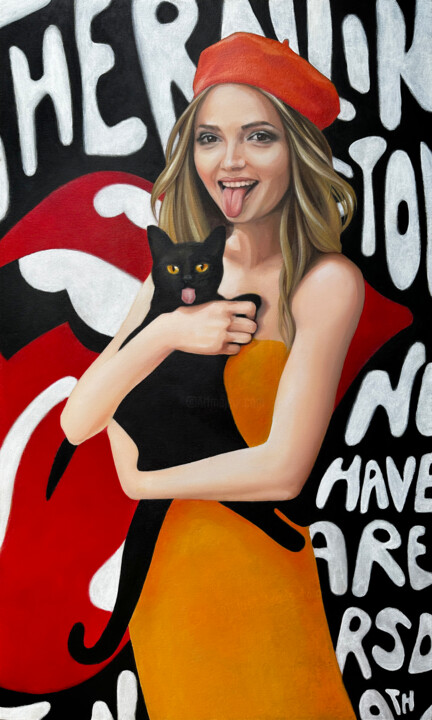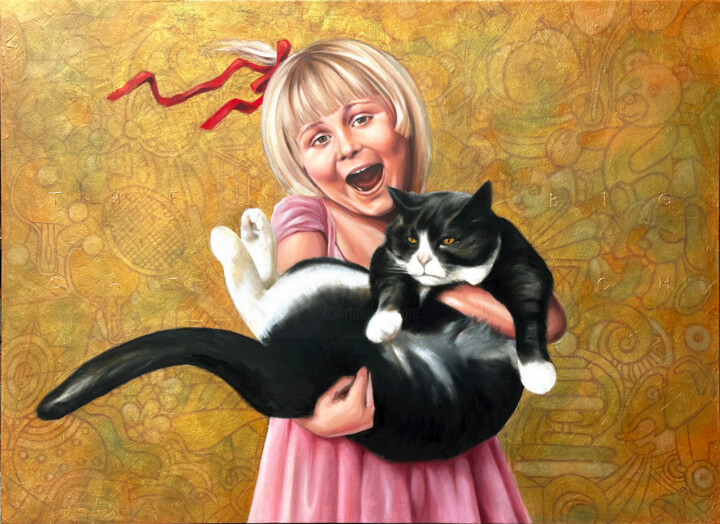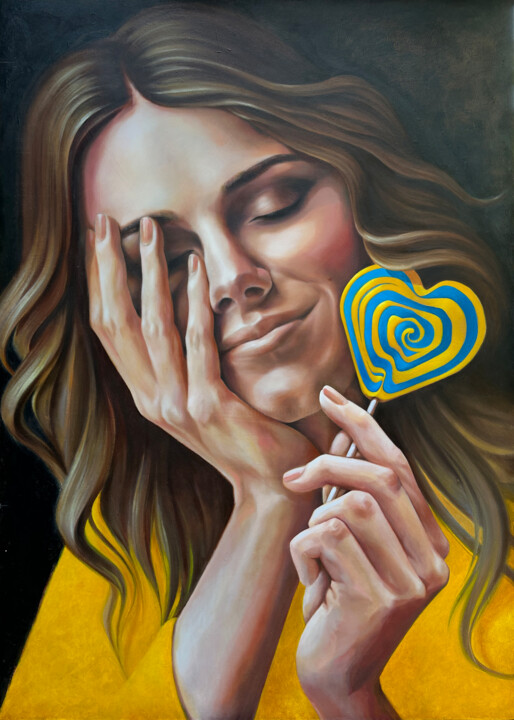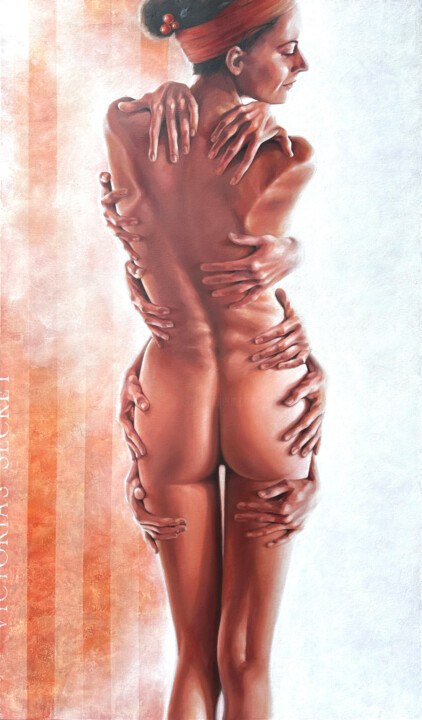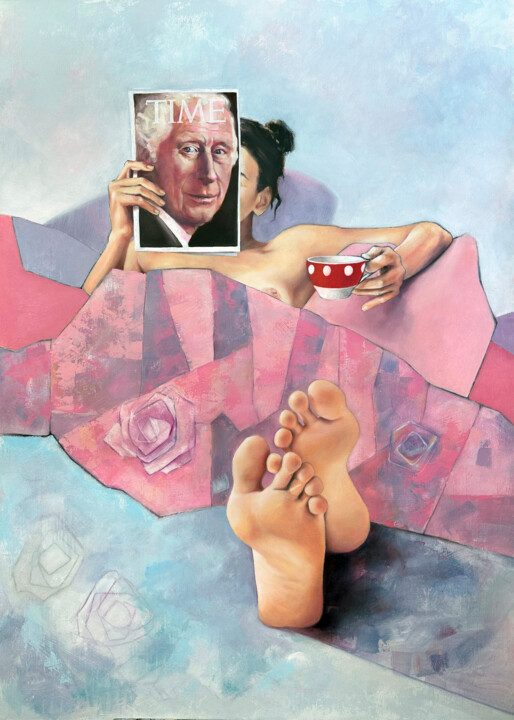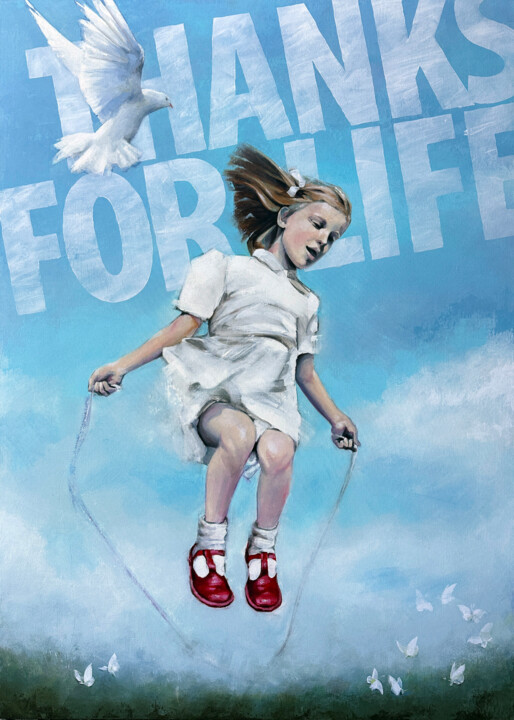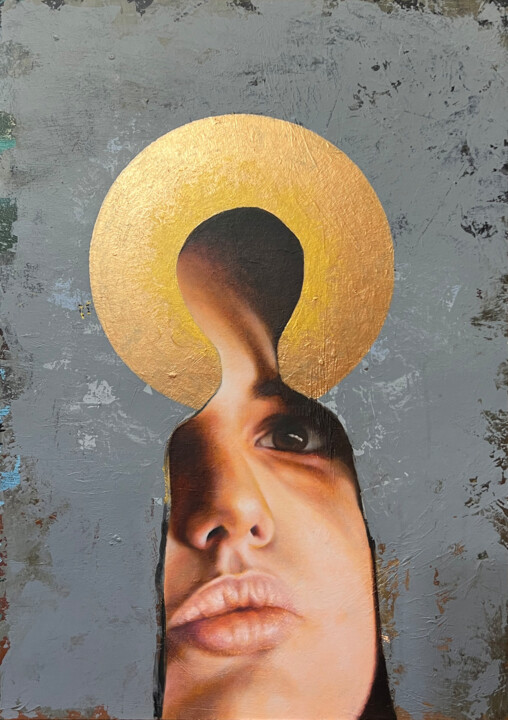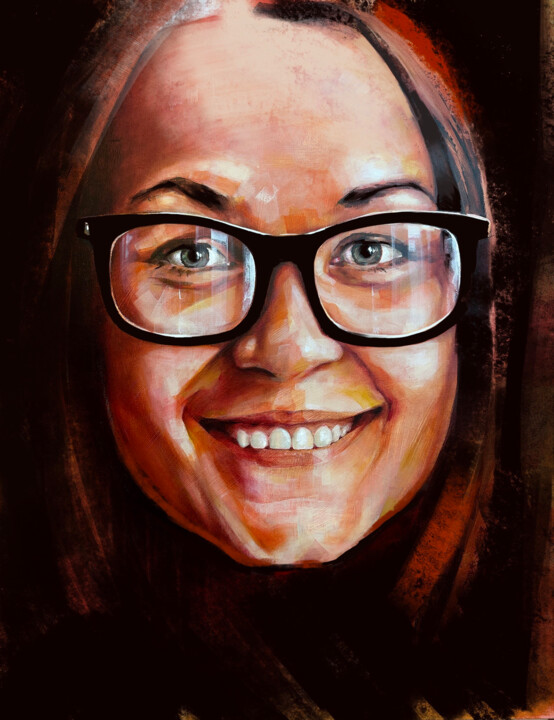What inspired you to create art and become an artist? (events, feelings, experiences...)
I don't believe there even is a choice like this—to become an artist or not. To me, whether or not you are something is merely the visible layer presenting your inner thoughts, feelings, and the way you interact with the world. Each profession has its own particular type of identity that fits. Scientists, doctors, construction workers, teachers - each has specific modifications, or what we might call talents. Talent is something everyone has, and with these talents comes the unavoidable urge to put them to work. That's it! There's no need for advanced mathematics and no room for decision-making either.
Perhaps there might be other reasons to do something, but if that's the case, I've never come across them. For me, it's always about enjoying myself and putting my talents to use. It's all because that's what I can do, or, to phrase it more precisely, I simply can't and don't want to do it any other way.
What is your artistic background, the techniques and subjects you have experimented with so far?
Actually, I'm a graphic artist. For the mostly black-and-white lines I've created, people are willing to pay quite the sum. There, with graphics, I feel like a fish in water. I even feel as though I have control over things. However, with painting, even though I've studied it, I've never felt comfortable. Perhaps that's why, whenever I do paint, it feels somewhat exclusive. Not because painting is somehow superior, but because I have no idea what I'm doing. Both of these techniques embody something from the worlds of the masculine and the feminine. My work in graphics leans towards the masculine, but when I paint, it brings out an unfathomable feminine side. I don't think it's really possible to understand femininity; you can simply feel it. That's why I am particularly interested in the subject of women. They are so beautiful and magical - just like art itself.
What are the 3 aspects that differentiate you from other artists, making your work unique?
Here, in this reality, the only constant is the fact that nothing truly is. There are no two things that are the same. Even two golf balls are never identical, let alone people. And you are asking me how one 'weirdo' is different from all the other 'weirdos'! You and I, like everyone else on the planet, are different aspects of the same thing. By being this way, we make everything else different as well. If you look at things through this lens, I am neither better nor worse than anyone else. I am unique, like everyone else. And, of course, each process is unique, and art is a wonderful and always unique process, regardless of whether you like the result or not.
Where does your inspiration come from?
I really, honestly have no idea, but I am sure it has nothing to do with any specific thinking process or action of mine. The ideas are simply here around. When I notice things and situations (and this happens continuously) in real life, dreams, TV, photography, or somewhere on the internet, I sometimes encounter materials that initiate an interpretation process within me. That's the moment I recognize them as potential topics, whether in my mind, a silly notebook, my phone, or anywhere else. When the time comes to feed the creative demons again, I look through the 'files,' find the topic that seems most fitting to my current mood, and off we go! Unfortunately (or fortunately), there are millions of these files, and this life would simply not be enough to paint it all out, even if that's all I was doing.
What is your artistic approach? What visions, sensations or feelings do you want to evoke in the viewer?
Actually, I don't aim to evoke anything specific with my art. The thing with art is that I realize that for the most part I have no personal control over this process. That's why questions such as 'Why did you paint this in this particular way?' or 'What did you want to say with this art piece?' often seem unnecessary to me. I didn't set out to say anything, and most of the time, I don't even know why I made certain choices. It's an uncomfortable feeling when people expect an explanation, but I have nothing to say to them. More than that, I don't want to say anything.
From a very humane perspective, if people like my art, I'm ready for my ego to be boosted. But if not, then it's not my fault, and that's quite convenient! Initially, it was my decision to paint or draw something a certain way, and of course, there's a particular subject or inspiration behind it. But I'm putting it out there for my own sake, not for others. If anything, the end result is really not my conscious decision.
What is the process of creating your works? Spontaneous or with a long preparatory process (technical, inspiration from art classics or other)?
Both spontaneous and methodical! I do have these pre-saved 'files,' each containing a potential idea for implementation. But saving these ideas isn't exactly preparation work; it's more like idea storing, and it happens uncontrollably 24/7. The choice for me is not about what to paint, but whether to paint at all. Once I decide to paint, the topic is subject to the moment - it's spontaneous and tailored to my current mood. However, before I get to the canvas, I do sketch out a composition, so in that sense, there is preparation involved.
Very rarely is an artwork finished in one evening; it's usually a slow, unhurried process. Because of this, I often work on at least five paintings simultaneously, as I never know what mood I'll be in. If the mood doesn't align with any of the existing five, I'll simply begin a sixth. Or the seventh. No problem!
Usually after some time, I don't like my own paintings anymore, and I often partially or fully repaint them. As a person, I am very oriented on the process. Yes, a good result obviously brings me joy, but if the result is bad - I don't lose sleep over this. I simply overlay a new beautiful process on top of the unsatisfactory result. Lucky for those paintings that find owners before I repaint them.
Do you use a particular work technique? if so, can you explain it?
When it comes to my painting technique, it starts with my strong skills and ends with the technique where it's lacking. I begin by graphically bringing the idea to the canvas. This is the masculine and pragmatic part of my art that is based on my skills and knowledge. At this moment, it's a good and finished work of graphics. And how else could it be? I am a damn good and professional graphic artist - no surprises here. But then I throw this fine work to be pulled apart by colours.
I work on the sketch with dry watercolour pencils, which allows me to control the process at least in the beginning. But when I start using paint, the control is lost completely. The pencil dissolves together with the whole sketch, and I am fully at the power of the unknown. The feminine always wins, even if it ends with a crash. Often in my finished works, you can still notice some pencil lines that have survived. These are the leftovers of my pragmatic and professional integrity. I think that's wonderful... Symbolic even.
Are there any innovative aspects in your work? Can you tell us which ones?
For me, painting is a never-ending innovation. Every time I pick up a brush, I feel a mixture of fear and respect, but after the first stroke on the canvas, those feelings vanish. All that's left is euphoria and surprise. It's like going on a first date - all the planned innovations, tips, and tricks are forgotten at the moment of impact, and yet, somehow, intuitively, we always manage to navigate the situation
Do you have a format or medium that you are most comfortable with? if yes, why?
Obviously, the pencil is my preferred medium. I'm a graphic artist after all. When I hold a pencil between my fingers, it's like I myself become one. As for the format, I have kept my paintings limited to the size of 2x2 meters because a canvas larger than that would simply have a hard time fitting into my studio.
Where do you produce your works? At home, in a shared workshop or in your own workshop? And in this space, how do you organize your creative work?
I have a small studio at home. It is important to be comfortable (at least for me), but I don't necessarily think a huge studio equals better, more effective, or qualitative work. But it does influence the size of the canvas. Until this moment, though, I have not felt a huge urge to paint on bigger surfaces. The only thing I am crucially lacking is additional storage space for my paintings. Otherwise, I'm just cramming everything on the sides of the room, and the already small studio just keeps shrinking in size. This is something I should resolve.
Does your work lead you to travel to meet new collectors, for fairs or exhibitions? If so, what does it bring you?
My work both pushes and allows me to travel and visit a large amount of art fairs and exhibitions, although when visiting exhibitions or fairs I don't like to speak to others, not even with other artists or gallerists. My undivided focus is on looking at artworks. They inspire me to paint. Either I don't like them and I feel superior, which is a nice ego boost, or I love them a lot, and then I feel jealous. Not the best feeling, but inspiring all the same. I haven't had any particular meetings with collectors, since when I'm attending exhibitions I'm in a way taking on the role of a collector myself. Me and my colleagues did recently have a conversation discussing that we should better understand the needs of collectors, but for me, it's not for the reason to better understand what they want to see in paintings. When I paint, I don't think about whether or not my work will be liked or disliked by someone. I paint only for the sake of painting.
How do you imagine the evolution of your work and your career as an artist in the future?
When it comes to painting, to be very honest, I don't imagine or plan anything. I am creating art because that's what I'm used to doing, and there's no other way for me to be. There's not much I feel I should achieve in art, so now I just paint. And, if someone likes my art, I am willing to sell or gift it. Overall there are no practical or rational reasons that explain why I'm painting. I actually could say it's a very useless occupation, but it does keep me in the right mental balance. It makes me happy, and there's nothing more important than that. It has nothing to do with career. Although, anything can happen…
What is the theme, style or technique of your latest artistic production?
When speaking about my paintings, I must say that most of them can be referred to as “latest,” since I have only been painting regularly for about the last 10 years. I already explained my technique a bit earlier but regarding the themes: when I was around 5 years old and stopped drawing cars, I started drawing women. I think my wife is a little jealous of these girls. Sometimes she asks, "Why this theme again? Who wants to put unknown aunt on their walls?" Well… for example, I do! And sometimes it turns out it's not just me.
I also really enjoy painting portraits, even portraits of men. One gallerist once said that he doesn't understand why portraits should be made at all (this was a comment about this theme in general, not about my work specifically), because they're boring. I suppose he was right in a way. Perhaps it's just as boring to put a portrait on your wall as a painting of an unknown woman. But to paint it - that's the opposite of boring!
Anyhow, I paint very ordinary things. The reason I paint the subject can be complicated, but the illustration itself is always simple. I have this thing - a tendency to deform or expand reality, to go beyond what's visible to the eye. When I see an object or event, in my mind I browse through different potential options for the same thing. I think about what happened before the event, what will happen after, why it's exactly like this, and why not any other way. This process is happening in my mind continuously. And when I paint, I don't paint the thing or the event itself - I paint the potential of it.
And I also really like using words. Words have tremendous power, and I respect that. You should never underestimate the power of words. The whole world is built on them, and the world is as it is because of words… and women. So what I do is - paint women and add words on top. These words are part of the untold story, even if it can't be told in full.
Can you tell us about your most important exhibition experience?
As a graphic artist, I have participated in exhibitions, most of them out of coincidence, but that was such a long time ago, it's no longer relevant. I have never had a solo exhibition. I have to admit, sometimes I think about the option, but something about this idea doesn't sit well with me. I somehow feel that the process of exhibiting your works is some sort of boasting (and that makes no sense since I don't really feel responsible for my works) or giving your art away for evaluation (and this, on the other hand, frightens me). I don't like when artists often force their works in your face as something extremely valuable and important, and I don't want to be that way. I don't like opinions and long conversations about art, as if anyone really knew what should be said about it. What I feel is lacking is humility in front of the art itself. In my world, art can be simply liked or disliked, and that's it. On the other hand - if I don't have the solo show, no one will know what I'm doing. But then again - why is that something anyone should know? People already have enough things to know. All of this just proves that I'm in the process of thinking over whether I really want it, and whether I or anyone else actually needs it.
If you could have created a famous work in the history of art, which one would you choose? And why ?
It's not that I specifically want to claim any works, but if I must answer, then let's go with the Mona Lisa. I'm not sure I would have painted it, certainly not this girl, and not in the way Leonardo did. But the technique, with the thin layers of paint and multiple levels, fits me well. Although I must say, and I apologize for this, I don't find this girl very attractive to me. I chose this piece because since it's famous, then it can be famous without compromise.
If you could invite one famous artist (dead or alive) to dinner, who would it be? How would you suggest he spend the evening?
I don't have any authority among artists, and I couldn't really say I particularly want to dine with them. However, among artworks, that's a different story - I have authority among those. There are artworks that I love so much, they annoy me at the same time because I can't stop staring at them. But I can't really invite a painting to dinner, right? (Although why not? That's a good theme!). What matters is that being an author, a talented artist, or even a genius doesn't necessarily make you a good and enjoyable person. But it would be my pleasure to have dinner with someone who is primarily a personality and secondarily devoted to art. Let's say, for example, Churchill. I find him to be unexplainably perplexing and wise at the same time. I have a feeling the dinner would be a disaster… But I think I would still enjoy it.





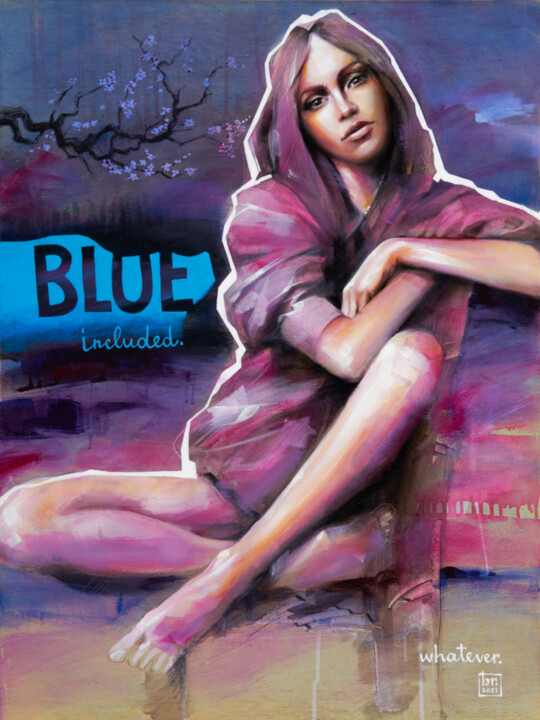

 Olimpia Gaia Martinelli
Olimpia Gaia Martinelli

